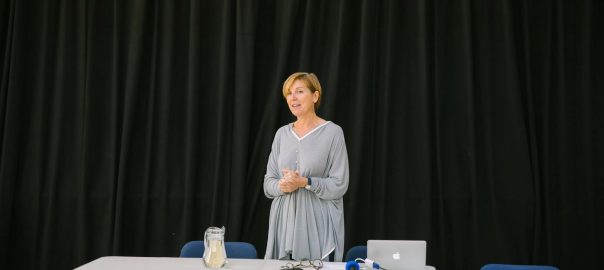For the second year running, the TMC research project sponsored a panel at the Africa in Motion film festival. This year the focus was Moroccan music documentaries and we were honoured to welcome two of the most important directors who have worked in this area: Izza Génini and Ahmed El Maanouni. The Africa in Motion festival has always tried, wherever possible, to offer its audiences more than a simple screening of a film.
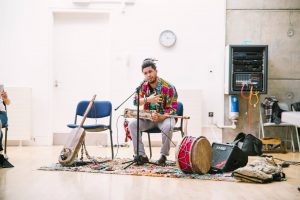
The TMC team were therefore delighted for the opportunity to develop a ‘Call and Response’ workshop on Moroccan music documentary, including live music from the talented Moroccan musician Omar Bin Afif.
The workshop began with a presentation from TMC project Co-Investigator Prof Florence Martin, providing insights into the cultural significance and diversity of music in Moroccan culture, as well as the role of directors such as El Maanouni and Génini in preserving this rich musical heritage through their documentaries. The presence of Omar meant that those participating in the workshop were fortunate enough to have a live demonstration of the various styles of music discussed by Flo.

Following a break for mint tea and Moroccan sweets and pastries, also prepared by Omar – is there no end to this man’s talents?!?! – the audience were then treated to an ‘in-conversation’ with the filmmakers, chaired by TMC Principal Investigator Prof Will Higbee. Both Izza and Ahmed spoke of their passion for the music in their films, their professional collaboration (Izza was also the producer of El Maanouni’s cult classic Trances) as well as the power of music and cinema to cross cultures and engage audiences. A memorable afternoon for all present ended with an extended performance by Omar.
Later that day, the TMC research team along with the filmmakers moved on to the Filmhouse for a double bill of Moroccan music documentaries, followed by a Q&A.
The first film to be screened was the short documentary Aïta (1987), directed by Izza Genini. Aïta is the first film in a ten-part series of documentaries on Moroccan music made by Izza between 1987-1992 entitled Maroc: corps et ame / Morocco Body and Soul. The film’s title refers to a style of popular music in Morocco, associated with the Cheikat – female troubadours who travel across Morocco singing at festivals and moussems, combining song and dance to recount epic events from Moroccan history and turning their cries and sways into emotionally-charged songs and performances. Aïta follows Fatna Bent el Hocine – one of the most popular and celebrated Cheikhats in the history of Moroccan music. The film itself is structured around performances by the singers and musicians at the Moussem of Moulay Abdullah – a traditional tribal gathering involving horse-racing, feasts, music and dancing. However, the moments that Génini captures of the singers between performances (off-stage, relaxing, rehearsing) are as important to the film as the performances themselves.
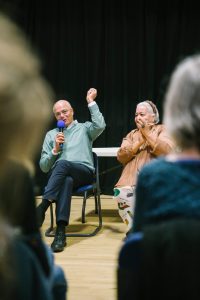
Originally a distributor and producer of feature films, Genini found herself making documentaries as a way to explore her Moroccan past. In this way, the documentary project of which Aïta was a part is an important act of safeguarding a collective cultural memory – a means of archiving Moroccan music and cultural traditions. However, for Genini, a Moroccan Jew who left Morocco as a young woman to study in Paris, the city she made her home, the music documentaries are also an intensely personal creative act; a way for her to connect with the country of her birth and her own cultural heritage.
The second film on the TMC double bill was Trances, the feature-length documentary directed by Ahmed El Maanouni and produced by Izza Génini that has achieved cult status in Morocco and internationally since its release in the early 1980s. The film follows the massively popular Moroccan group Nass el Ghiwane, who combined the rock and roll swagger of The Rolling Stones with a deep understanding and respect of the diverse musical and poetic heritage of Morocco.
Trances is the second feature-length film directed by Ahmed el Maanouni (he also worked as a cinematographer) and followed the international success of Alyam Alyam (1978) which was the first Moroccan film to be represented at Cannes and win the Un Certain Regard prize at the Director’s Fortnight, as well as many awards at festivals across the world. In a career spanning almost 40 years, Ahmed El Maanouni has established himself as one of the most important Moroccan filmmakers, and a passionate advocate and supporter of Moroccan cinema and a new generation of Moroccan filmmakers, working across documentary and fiction, most recently releasing the popular comedy Fadma (2017) for which he was given the award for best director at the National Film Festival in Tangier earlier this year.
Trances mixes concert footage (from Carthage in Tunisia; Agadir and Essaouira in Morocco; and Paris), filmed interviews with the band and black-and-white archival footage. However, the film is much more than a concert film, as it shows the cultural and socio-political importance of the group Nass el Ghiwane to a generation of young Moroccans – as well as the way that the group turned away from the often-romantic musical influences of the Eastern part of the Arab world to focus on the diverse sounds, instruments and musical and poetic traditions of Morocco. Crucially, the songs were sung in Darija (Moroccan Arabic) to ecstatic young audiences, who could relate not only to the message of the music and its traditions but also the language in which it was delivered.
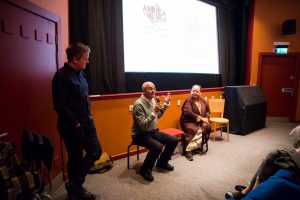
The film has been a huge success internationally, garnering plaudits and attention at festivals across the world. As such it also had the honour of being the first film selected by Martin Scorsese to be restored as part of his World Cinema Foundation / World Cinema project. Trances captures the excitement and energy of Nass el Ghiwane in concert as well as exploring the diverse origins of the band’s music, their desire to re-engage a new generation of Moroccans to a music and poetry from which they may have felt disconnected, as well as exploring the social political resonances of the band’s music. While Nass el Ghiwane may have often played down suggestions of political messages in their work, the power of the images and editing of Ahmed’s film, juxtaposing the band’s music with contemporary footage of Morocco and archival material from the colonial period show the socio-political resonance that the band obviously had for its young audience.
Speaking eloquently at the Q&A after the film, both Izza Genini and Ahmed el Maanouni considered the impact of the film on their careers as well as the cultural and political significance of Trances in the history of Moroccan cinema. Izza told us how she worked with Maanouni on the film, about a band she had been a fan of for a long time, and Maanouni confirmed the continued importance of the band and Izza’s work. Maanouni finished by suggesting that, in selecting the film as the first to be restored and distributed via the World Cinema Project, Scorsese had offered him a ‘gift’. I would look at this a different way, and suggest the gift was in fact offered by Ahmed and Izza to Scorsese and audiences across the world who, like the appreciative crowd in the Filmhouse, have embraced this key work of Moroccan cinema – arguably the first Moroccan film with a truly global reach – ensuring that more than three decades on the film continues to have the power to move and engage audiences.
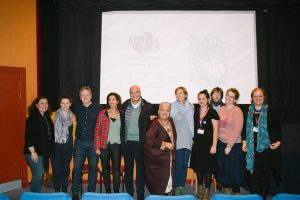
The TMC project team gratefully acknowledges the support of the AHRC for making this Call and Response event possible. We are also grateful to our project partners, the Africa in Motion festival, for allowing us to put on the events as part of the film festival. Thanks too to Omar Bin Afif for bringing the music alive at the workshop and to Dr Stefanie Van de Peer for her organisational skills and curatorial expertise in programming this event.
Will Higbee
